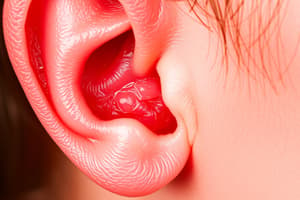Podcast
Questions and Answers
Which of the following are types of ear infections?
Which of the following are types of ear infections?
- Otitis externa
- Otitis media
- Mastoiditis
- All of the above (correct)
What is otitis externa?
What is otitis externa?
Inflammation or infection of the external auditory canal, the auricle, or both.
What causes acute localized otitis externa?
What causes acute localized otitis externa?
- S.aureus (correct)
- Fungi
- Corynebacteria (correct)
- All of the above
What are the clinical manifestations of acute diffuse otitis externa?
What are the clinical manifestations of acute diffuse otitis externa?
What is the primary treatment for otitis media?
What is the primary treatment for otitis media?
The surgery to relieve chronic otitis media is called ______.
The surgery to relieve chronic otitis media is called ______.
Mastoiditis is always associated with a perforated tympanic membrane.
Mastoiditis is always associated with a perforated tympanic membrane.
Which medications can contribute to hearing loss?
Which medications can contribute to hearing loss?
What is conductive hearing loss?
What is conductive hearing loss?
Which of the following is a risk factor for hearing loss?
Which of the following is a risk factor for hearing loss?
Flashcards are hidden until you start studying
Study Notes
Ear Disorders Overview
- Ear infections include otitis externa, otitis media, and mastoiditis.
- Conditions can be subdivided based on location: external, middle, and mastoid areas.
Otitis Externa
- Defined as inflammation or infection of the external auditory canal and/or auricle.
- Types include:
- Acute localized
- Acute diffuse
- Chronic
- Malignant
Causes of Otitis Externa
- Common pathogens:
- Staphylococcus aureus
- Corynebacteria
- Streptococcus pneumoniae
- Haemophilus influenzae
- Moraxella catarrhalis
- Pseudomonas aeruginosa
- Varicella-zoster virus
- Certain fungi (e.g., Chlamydia, Mycoplasma)
Clinical Manifestations of Otitis Externa
- Acute localized: pustule or furuncle present, possible haemorrhagic bullae, lymphadenopathy.
- Acute diffuse: itchy, painful, red and swollen canal.
- Chronic: severe itching due to irritation.
- Malignant: deep tissue infection mostly in immunocompromised patients (e.g., diabetics, HIV/AIDS).
Treatment of Otitis Externa
- Treatment depends on presentation:
- Topical therapies
- Systemic antibiotics
- Surgical options (incision and drainage)
Otitis Media
- Infection/inflammation with fluid presence in the middle ear.
- Types include:
- Acute otitis media
- Otitis media with effusion
Factors Associated with Otitis Media
- Risk factors include:
- Immunosuppression
- Inadequate breastfeeding
- Anatomical anomalies (e.g., cleft palate/uvula)
Clinical Manifestations of Otitis Media
- Specific symptoms: ear pain, discharge, hearing loss.
- Non-specific symptoms: fever, irritability, tinnitus, lethargy.
Treatment for Otitis Media
- Primary antibiotic treatments:
- Amoxicillin/clavulanate, cefuroxime, cefixime, erythromycin.
- Decongestants (oral/nasal) may help with eustachian tube obstruction.
Chronic Otitis Media
- Characterized by recurrent episodes of acute infection.
- Managed surgically through:
- Myringotomy (tympanic membrane incision)
- Adenoidectomy
- Tympanostomy tube insertion
Mastoiditis
- Often follows acute otitis media; involves inflammation of mastoid air cells.
- Clinical features include:
- Swelling, redness, tenderness over mastoid area.
- Possible displacement of pinna and purulent discharge.
Diagnosis of Mastoiditis
- Specimens obtained via:
- Pus discharge collection from ear
- Tympanocentesis if tympanic membrane not perforated
Treatment of Mastoiditis
- Similar antibiotics as in otitis media.
- Mastoidectomy indicated for abscess formation and uncontrolled sepsis.
Hearing Loss Overview
- Affects over 30 million people daily, especially in noisy occupations.
- High-risk professions: carpentry, plumbing, coal mining.
Types of Hearing Loss
- Conductive: issues with sound transmission (e.g., impacted cerumen, otitis media).
- Sensorineural: cochlea or vestibulocochlear nerve damage.
- Mixed: combination of conductive and sensorineural loss.
- Functional (psychogenic): not linked to structural abnormalities, often emotional in nature.
Risk Factors for Hearing Loss
- Family history of hearing impairment.
- Congenital malformations of cranial structures.
- Ototoxic medications (e.g., gentamicin, loop diuretics).
- Recurrent ear infections and bacterial meningitis.
- Chronic noise exposure and tympanic membrane perforation.
Studying That Suits You
Use AI to generate personalized quizzes and flashcards to suit your learning preferences.




